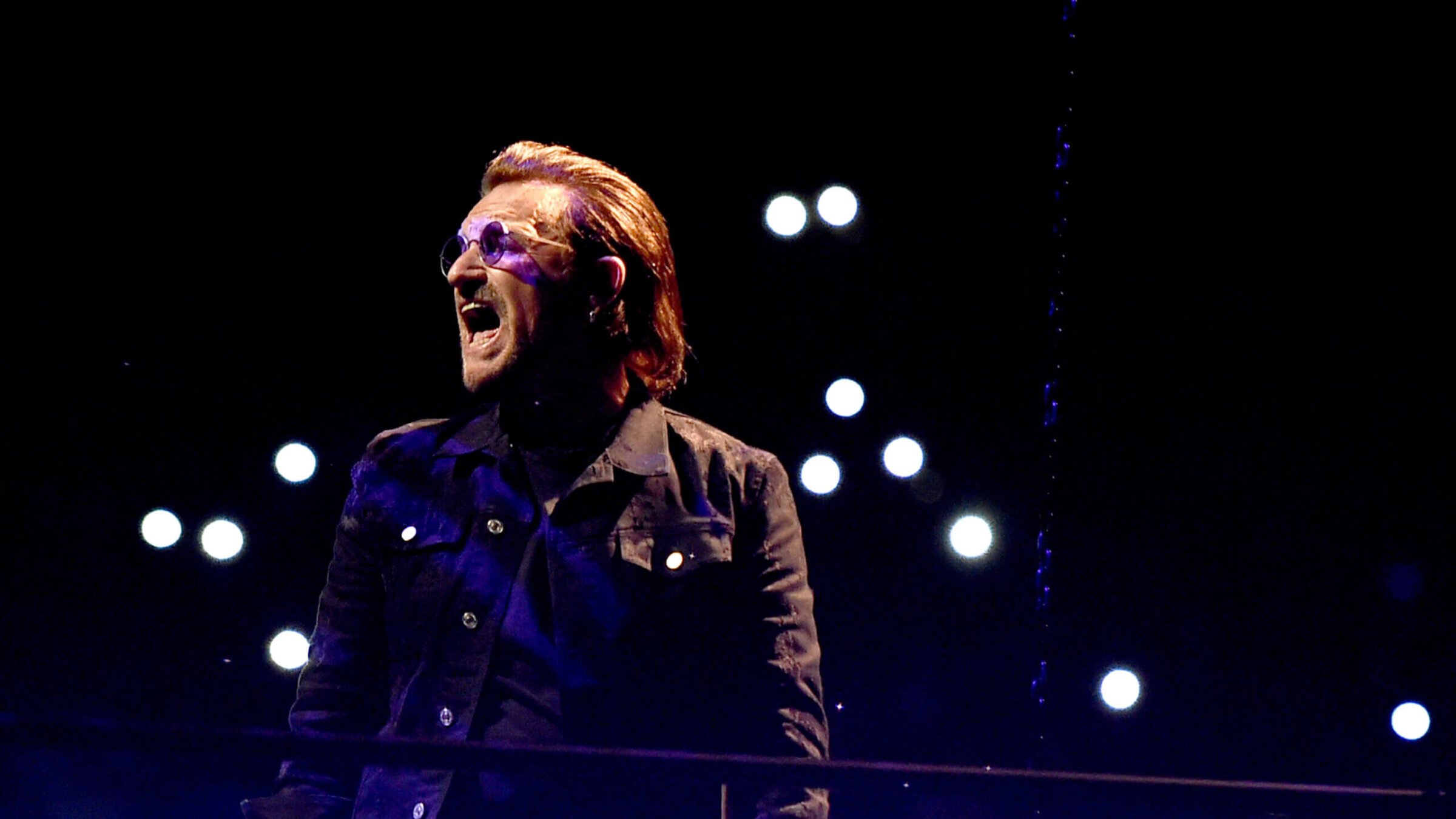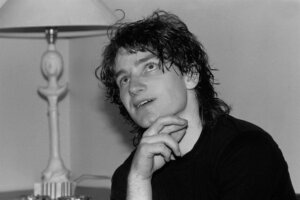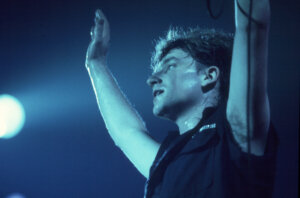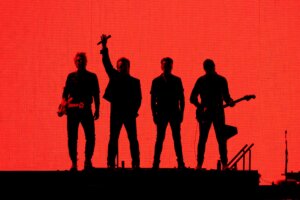Inspired by Elijah, Jeremiah, Bob Dylan and himself, Bono embraces the Jewish roots of his Christian faith
In his new memoir, the U2 frontman chronicles his rise from the Shalom Fellowship to the world stage

Bono performs with U2 in 2018 in Inglewood, Calif. Photo by Getty Images
Surrender: 40 Songs, One Story
By Bono
Knopf, 577 pages, $34
Bono would like you to know who he sat with over the years.
“I am sitting on Harry Belafonte’s bed.”
“We’re sitting with Rupert Murdoch …”
“I was sitting in Renards Nightclub in Dublin with the prodigiously talented actor Cillian Murphy.”
“I’m sitting in the front seat of a red Range Rover. The driver is Paul McCartney.”
Sometimes the sitting happens at a table: “In the third term of Tony Blair’s government, I enjoyed a late dinner at 10 Downing Street.”
And sometimes you answer your front door only to find a celebrity even more famous the world over than you are: “The doorbell rings on this particular day in January 2002. I’d forgotten to tell Ali [Bono’s wife] that Mikhail Gorbachev might drop by.”

A penchant for name-dropping
Such is life when you are the frontman and lead singer of U2, who for a long stretch in the 1980s and 1990s (and perhaps beyond) were the biggest, best-known and most popular rock band in the world. So perhaps Bono could be forgiven his penchant for name-dropping in his new memoir, “Surrender.” He is only just telling it like it is — or was — even if he chummies it up a bit too much on occasion by referring to Gorbachev on second reference as “Gorby” and then-U.S. national security adviser Condoleeza Rice as “Condi.”
These are only a few of the dozens of fellow celebrities, musicians, businessmen, world leaders and religious figures Bono writes about when he is not recounting the gripping and somewhat unlikely tale of the scrappy musical quartet that emerged out of Dublin’s punk-rock scene on its rise toward global musical domination.
The thread running through Bono’s autobiography — through the music and the social activism and the family relationships and friendships — is Bono’s well-known Christian faith, shared variously by three of the four members of U2 (bassist Adam Clayton is the sole agnostic holdout in the band).
Bono’s brand of Christianity impels him to do more than strive for the next hit record; it compels him to leverage his significant power as one of the world’s most famous (and doggedly competitive and persistent) rock stars toward a greater mission, or missions, of causes including but not limited to relieving world hunger, cancelling Third World-debt, eliminating AIDS in Africa, and on and on.
The Shalom Fellowship
The product of a mixed marriage (father Catholic, mother Protestant), Paul “Bono” Hewson and his bandmates, drummer Larry Mullen and guitarist David Evans aka Edge, forged their early religious bonds in the Shalom Fellowship, a small, Dublin-based Christian cult they belonged to in the late 1970s and early ’80s that practiced “a kind of naïve first-century Christian life that anticipated few possessions but plenty of miracles.”
As such, the principles of their faith were closely tied to the historical Jewish roots of early Christianity, and throughout his memoir, Bono displays a familiarity and ease with those roots and scriptures, such that his references are as often to Moses, the Prophets, and biblical figures as they are to Jesus and his disciples.
“We found it normal to begin hanging out with the street preacher Dennis Sheedy,” Bono writes. “Dennis was a kind of latter-day Jeremiah, the Old Testament prophet, but instead of going for the people of Israel, Dennis was going for the people of Dublin.” As they came to embrace the women they would marry, writes Bono, “We were enthralled by the beautiful notion in the Torah: ‘Therefore shall a man leave his father and his mother, and shall cleave unto his wife: and they shall be one flesh.’” You can almost hear him breaking the glass underneath the chuppah.

Confronting contradictions
This was not exactly the stuff of sex and drugs and rock ‘n’ roll (although there seems to have been a fair amount of that in their social penumbra). But more basically, the group found itself running up against the prevailing notions that the pursuit of rock ‘n’ roll stardom did not fit in with the lifestyle avowed by the Shalom group.
“In truth something never sat right with us about this ‘in or out’ Christianity or the judgmentalism it came with,” writes Bono. “This was exacerbated by church people’s attitude toward Adam, who didn’t identify as a believer, who wasn’t part of any faith.”
Bono displays some of his greatest insights when he writes, “I, too, wanted to make music capable of carrying our own weight, even the weight of our own contradictions. To be ‘in the world but not of it’ was the challenge in the scriptures that would take a lifetime to figure out. As artists we were slowly uncovering paradox and the idea that we are not compelled to resolve every contradictory impulse.”
While he and his bandmates ultimately broke with the Shalom fellowship, they carried on their beliefs that they could incorporate what they found to be just and holy in their careers in music. Poverty, Bono writes, “is second only to redemption in the priorities of the God found in the Old and New Testaments. It’s a theme you can trace from Moses to Doubting Thomas, from the Torah through the beatitudes.”
Citing Jewish tradition
When it came time for him to join up with those seeking to begin the 21st century with a First World pledge to cancel the accumulated debt that found Third World nations shackled in a position of “economic slavery” vis-à-vis their former colonial masters, Bono took inspiration from the Jewish tradition of redemption of debt.
“Jubilee, I learned, was a biblical idea: ‘a year of Jubilee,’ described by the Hebrew prophet Isaiah as a year of the Lord’s favor,” writes Bono. “In Jewish tradition every seventh cycle of seven years you must write off people’s debts and release them from their bondage.”

Bono frequently returns time and again to the work of Bob Dylan for its latter-day prophetic impulses: “Life is a constant dying and being reborn, dying and being reborn,” writes Bono. “The rabbinical Bob Dylan was already there. ‘He not busy being born is busy dying,’” he says, making reference to Dylan’s song “It’s Alright Ma (I’m Only Bleeding).” Bono also is sophisticated enough to reiterate that Dylan’s period in the late 1970s and early 1980s was less of a “born again” experience than it was a reminder “that Christianity started out life as a Jewish sect.”
‘Mysterious Ways’
And on the origins of one of U2’s biggest hits, “Mysterious Ways,” Bono engages in some mystical midrash of his own: “The lyrical genesis of this song had been a conversation with Jack Heaslip [an Anglican priest who served as a longtime spiritual mentor to U2] where he mused on the idea that the gender of God is not clear in the original biblical Hebrew. In fact one of the names of God, El Shaddai, means ‘the breasted one.’ If the greatest creative force in the world is a woman giving birth, then of course the greatest creative force in the universe is likely to be a feminine spirit.” (For the record, the meaning of “El Shaddai” has been the subject of great debate among Torah scholars for centuries.)
Toward the end of the 577-page book, Bono writes, “I was always fascinated by the story of Elijah, who is told to wait on the voice of God in a cave on a hillside.

The ‘still small voice’
“When it arrived,” he continues, “the divine communication was such a whisper that Elijah almost didn’t recognize it. In one translation it is described as ‘the still small voice’; in another it is translated as ‘the sound of silence.’ Maybe Paul Simon heard it too.”
Bono’s voice may not carry the weight and import that it once did in popular music, to say nothing of in the Oval Office and the halls of the U.S. Congress. As a celebrity do-gooder, Bono ranks near the top in terms of his reach and effectiveness — certainly right up there with George Harrison, whom he credits for his efforts to bring relief to the people of Bangladesh in the early 1970s — in leveraging rock celebrity with social and political action.
Perhaps there is still a way for Bono to make a difference by adjusting his approach, perhaps by ditching some of his more operatic caterwauling and his grandiose propositions in favor of that “still small voice,” both on the page and on the concert stage.
















